Fresh curbs on welfare spending for those hit hardest by George Osborne's autumn statement will be needed to spare Whitehall departments from the full impact of £27bn in savings needed in the next phase of the government's eight-year austerity programme, Britain's leading experts on the public finances have warned.
The Institute for Fiscal Studies said that without further savings – either from benefits or tax increases – some areas of the public sector would be faced with "inconceivable cuts" in the next parliament.
While concluding that the poorest 10% of the population would see the biggest percentage drop in their incomes as a result of the autumn statement, the IFS predicted that the Treasury would be looking for additional savings from the welfare bill, including from pensioners.
The assessment came as Vince Cable, the business secretary, criticised Osborne for stigmatising those claiming state benefits as "shirkers" and Labour contested the chancellor's insistence that the better-off were losing most from his tax and spending changes.
Paul Johnson, the IFS's director, said the chancellor's spending plans for the years after 2014 implied deep cuts for those parts of Whitehall not protected by the government's ring fence.
In the event that the chancellor again decided to spare the NHS, schools and international aid from cuts, the IFS calculated that every other area of spending would have to fall by 16% in inflation-adjusted terms in the three years after the 2015 election.
"On top of what has happened in this spending review period, that would take cuts in unprotected departments to an average of over 30%. That looks close to inconceivable. There are big choices on health and welfare, crucially surely including benefits for pensioners, still to be made. And it is hard to believe that there won't be more tax rises to come."
Johnson stressed he would not expect the government to raise taxes or cut welfare by the full £27bn, but added that so far the balance between spending cuts and tax increases announced by the chancellor was 85/15 rather than the planned 80/20. Raising taxes by £7bn – equal to little more than 1p on the basic rate of income tax – would restore the 80/20 ratio, he said.
Osborne told BBC's Today programme that the wealthy were being made to pay their share. "The top fifth of the population are paying a greater share of their income, just over 4%, if you take into account all the measures that we have announced over the last two years," he said.
"That is more than any other quintile, any other fifth, of the population. But we are asking all parts of the population to make a contribution. You cannot deal with the biggest budget deficit since the second world war without asking for a general contribution from the whole population."
But the IFS analysis showed that the poorest 20% of the population would see their incomes cut by more than 1.5% as a result of the autumn statement, while the richest 10% would see a 0.5% reduction.
Rachel Reeves, shadow chief secretary to the Treasury, commenting on the IFS analysis of the autumn statement, said: "The IFS has exposed who is paying the price for George Osborne's economic failure. Their figures show that middle and low earners lost out from the autumn statement, with the poorest 40% losing more than the richest tenth."
Johnson said the effects of the chancellor's announcements "will be to reduce incomes in the bottom half of the income distribution, slightly increase them in the upper middle – among workers on modest salaries and among pensioners – and to reduce incomes for the best-off."
He added: "Some of course are riding out the hard times quite comfortably. But when you take account of what has happened to earnings, all parts of the working population have been losing out. In that limited and rather unhappy sense, most of us really are in this together."
Following the warning from the rating agency Fitch that Britain was at risk of losing its AAA credit rating, Osborne yesterday played down the risk. "It wouldn't be a good thing – but the credit rating is one of a number of ways in which people look at countries," he said. The chancellor has been warned privately by fellow Cabinet members that a downgrade is now almost inevitable following the deterioration in the economic outlook presented in the Autumn Statement. Osborne decided against imposing fresh austerity measures on the economy immediately, fearful of their impact on an economy that has flat-lined for two years.
Cable, interviewed on the BBC's World at One, expressed sympathy with a woman interviewed by the programme who said she objected to be labelled as a scrounger because she was receiving money from the state. He said: "I think the thing I really identified in what she said was this resentment of being regarded as a scrounger. I think that kind of approach and language is completely wrong. She is obviously working very hard and a highly responsible parent and we should be doing what we can to support people like her."
Cable also said that it was wrong to stigmatise people on out-of-work benefits in this way. "I made it fairly clear that that stuff about people being at home, unemployed, with curtains drawn was not the way I would have addressed it. I think most people out of work are looking for work. Most people in this country are very conscientious and not taking advantage of the system and we should do what we can to support them."



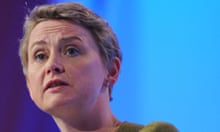
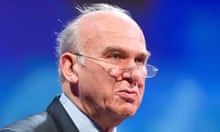

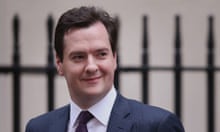
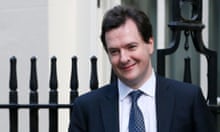
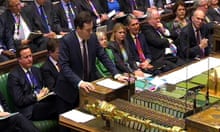
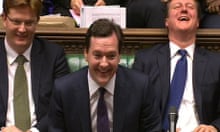

Comments (…)
Sign in or create your Guardian account to join the discussion